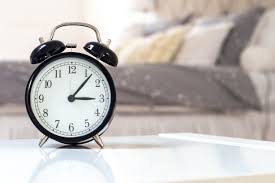The “Secret” to a Good Morning

May 26, 2020
Some way and somehow, I’ve been able to consistently sleep through my morning alarms, despite how loud they may be or however long they play, or however frequently they go off. And then, I wake up about an hour later than I wanted, and suddenly, my entire day’s been thrown off. We’ve unfortunately all been there. Maybe we ended up late to school, or just barely making our first period. Or maybe we’ve just ruined our morning, that could work into ruining the rest of our scheduled day. But why can’t we hear our alarms in the morning?
First, let’s take a look at our own sleep schedules. As a matter of fact, sleep schedules are incredibly important. According to scientific research issued in the “Bustle.com,” sleep schedules will align your body and its internal clock to real time, and your ideal “bedtime” and “wake-up time.” Of course, the amount of sleep you get heavily influences your energy for the next day while aiding your ability to wake up the next morning. However, this follows in hand with structuring a consistent, habitual sleep schedule. You need to adjust your body to be able to accustom itself to falling asleep at your set “sleep time,” as well as your “waking” time. Without a methodic sleep schedule, your body won’t necessarily know what to expect from you, or when it will next sleep or wake up. Instead, it will more or less work to glean whatever additional few hours of sleep it can, making it harder to wake up in the morning, as well as making your wake-up schedule more unpredictable. Whether it’s 8 a.m. or almost noon, your body will be working to get more sleep, disregarding your morning classes, or whether or not your alarm is going off. Getting your body and its internal clock accustomed to a scheduled sleep time alerts it as to when it should be getting up, and when it should really be going to sleep. Consistently falling asleep and waking up at specified times adjusts your body to a more regular cycle of sleep, making it easier to wake up.
Of course, as mentioned, the amount of sleep you get is also very important. While The National Sleep Foundation recommends a strict eight to ten hours of sleep a night, many high school students struggle with managing a solid seven hours of sleep, and usually end up getting even less than that minimum. Why? Because the teenage body has a natural inclination to sleeping later, due to hormonal time shifts. Hormones push teenagers’ internal clocks by one to two hours, which forcibly causes them to fall asleep later. However, early classes and implemented school schedules prevent students from being able to sleep in much later, which in result cuts into their much needed eight (at minimum) hours of sleep. And beyond just hormonal time shifts, teenagers stay up from a whole other collection of distractions, such as homework, social media, and binge-watching. Their “best” just so happens to be at 2 a.m., and with 8 a.m. classes the following morning, they’ll manage only a fraction of the sleep they’re really supposed to be getting, causing fatigue and sleep-deprivation. Sleep is essential for your mind and body, and if your body isn’t receiving enough of it, it may begin to take matters into its “own hands,” whether you decide you want that sleep or not. Waking up becomes increasingly difficult if you’re sleep deprived and exhausted, and your body will soon begin to disregard your alarms, no matter how loudly or how frequently they play, as it prioritizes sleep first.
I’m sure that by this point, we’re all able to understand that sleep is essential for our health, both mentally and physically. We need to sleep in order to rest our minds and bodies after a brutal day of consciousness. But according to an article published by Sleep.org, there’s more to it than just that. Let’s break it down. Sleep-repairing is a long and tedious process, and the completion of its stages largely impacts our ability to wake up in the morning. There are five major, recognizable stages to sleep. The first stage prepares and relaxes our body for a more thorough restoration process to begin. This brief sleep is very light, and you can be easily woken from this state as many of your other external senses are still active. In the second phase, your brain will begin to produce faster brain waves that will gradually slow, leading into the third and fourth phases. Your brain will produce slower brain waves, assembling our bodies for a deeper sleep. Major interferences with our rest will be suspended, including a lot of our external senses. Your body will continue to shut itself down in order to start healing cells, tissues and muscles. Your breathing and heart rate will slow as your body temperature dips. Followed by this deep sleep will be a REM sleep, the final stage. In REM sleep (rapid eye movement sleep) your body/brain will become more active as heart rate and blood pressure increase. You will gradually transition from heavy sleep to waking and whatever systems had been shut down previously will be “rebooted” and ready for the following day. Waking before this full cycle is completed may cause you to feel tired in the morning, making it much more difficult to get up and increasingly important for us to maintain better sleeping schedules. Turns out, there’s a far greater science to our alarm issues in the morning than we might’ve initially thought.
So, let’s take a step back and reevaluate our situations, and why it is that we’re constantly sleeping through our morning alarms. Maybe we need to reset our sleep schedules to follow a more orderly basis, or sleep earlier to meet those early morning classes while managing to get a solid eight (at minimum) hours of sleep. Other solutions may include changing up your alarm tones even setting multiple alarms in the morning. However, prioritizing our sleep-lives has become increasingly essential, especially now in quarantine during which our resolve to sleep at a reasonable hour has quickly dwindled. But following these simple procedures ensures a positive productive day, starting with a good, on-schedule morning.
















































































































































